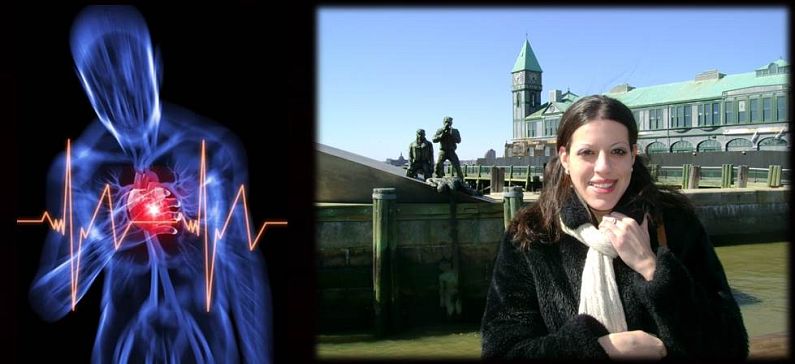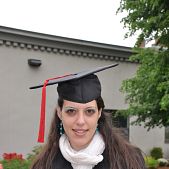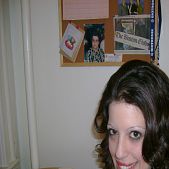You were born in Greece. Where are your origins?
I was born in Athens. However, my father’s origins are in Chalkida.
What’s your strongest childhood memory?
I admit that I don’t have any special memories of insouciance. I mainly recall that I was reading with military discipline since my early age. I remember that I was receiving lessons on three foreign languages. My father used to teach us that in life what you know is more important than what you own. The youngest you start learning foreign languages, the easier you absorb knowledge. So, I started learning English at the age of 4, French at the age of 7 and German at the age of 9. Two years before graduating from high school, I had successfully received all foreign language diplomas and I had the time needed to focus on my university entry exams.
Your research focus has been one of your interests since your early age?
I was dreaming of becoming a doctor since my early age. I decided to study the human heart when I was diagnosed with heart problems myself.
You lived in Greece until the age of 18. Did you ever have second thoughts?
I lived in Greece until the age of 18, but then I was forced to leave, because I had spent most of my studying time in hospitals due to health issues and I wasn’t fully prepared to take the university entry exams. Then, I lived in London for 7 years, before being invited to the United States for 4 months to study next to a brilliant professor of heart pathoanatomy, specializing in sudden cardiac death in the young population. These 4 months extended to 8 years. No, I don’t have second thoughts about my decision to leave Greece. Regardless of the hardships of being away from home, I had the opportunity to make my dreams come true.
Your career is impressive. Is it hard to stand out so soon?
It takes a lot of work for sure. Daily fights with little time for you. However, I was lucky enough to study in prestigious universities and be tutored by professors that supported me and helped me in moving forward.
As a member of a research team, you made a breakthrough discovery of a new drug that can help those suffering from life-threatening arrhythmias in the future. Please, share some information about your research and the importance of your findings with us.
I have dedicated the largest part of my life to the study of pathogenesis mechanisms of a disease called arrhythmogenic right ventricular cardiomyopathy. The disease can affect a large part of the world’s population, but it is different from various types of other cardiomyopathies, because it is typical of many arrhythmias at the early stages, when the heart’s structure appears normal. After having moved deep into the understanding of the complex mechanisms of cells and heart tissue, we decided to construct a model that would support us in detecting a drug substance that would cure the disease. So, we built a genetically modified fish that allowed us to diagnose cardiopathology in 48 hours. The fish’s heart was diagnosed with dilatation, three times bigger than normal that resulted to a chest protrusion. Using this model, we managed easily, fast and on a low budget to scan nearly 5.000 chemical substances and we discovered one that effectively cured the fish in one week’s time. We later tested in our laboratory this substance in the heart cells of mice and then in living organisms, in two different models of mice suffering with heart issues. When injected daily in mice for a few weeks, except from stopping arrhythmias, it can also prevent tissue mutations on the heart tissue and help the patient avoid any further development of a heart failure.
Next, we tested the chemical substance in heart cells of our patients. The results were impressive within the first 24 hours. Now, we need to clinically test the drug in our patients. The importance of the discovery lies in the fact that it targets the arrhythmia mechanism. Until currently, patients suffering from similar arrhythmia can prevent sudden death only by undergoing a defibrillator implant surgery. With this drug we will be able to prevent arrhythmias before they happen and not simply stop them after they have started. However, we still need to test that the same drug can help patients suffering from arrhythmias caused by different types of heart diseases and not only by arrhythmogenic right ventricular cardiomyopathy
In 2009, after having discovered an intrusive diagnostic examination for the arrhythmogenic right ventricular cardiomyopathy disease and having published the related article in New England Journal of Medicine, you became widely known. Could you explain the details of your discovery to us?
Arrhythmogenic right ventricular cardiomyopathy can be detected via traditional tests, like the traditional ECG and the heart sonography. However, in many cases the diagnosis is difficult, with a risk of error, driving the patient to believe that he suffers from dilated cardiomyopathy, myocarditis or cardiac sarcoidosis. The correct diagnosis plays a major role in dealing with a disease. After sampling a small piece of heart taken from the patient with the help of catheterization, the test I discovered allows us to check the placement of some proteins in the cells and to be nearly 100% correct in the diagnosis according to the results.
What can we expect from you in the near future?
To be capable to do my job with the same dedication I have been doing it for all these years.
Do you visit Greece often? Which places do you choose in particular?
I visit Greece twice a year, during Christmas and summer vacation. I choose Athens, because I visit Greece to spend time with my parents.
What does Greece mean to you?
Greece is my homeland, it represents my roots, regardless of the years I have spent living in London and Boston. Greece is and will always be my homeland. Moreover, Greece represents my mother and my father, my everlasting brace.
What is your top question to Greeks, supposing you had the opportunity to get their answer?
I don’t believe I have any question to ask Greeks. My only remark for children being born with health issues is not to allow anyone to disgrace them or make them feel inferior. They should pursue their dreams and have faith that they can make them come true.













Αθηνα Μαστορα
-01/10/2016 7:51 am
Σε ευχαριστουμε ως ανθρωποι
Vasilis Ntardas
-01/10/2016 5:40 pm
Μπράβο κοπελιά καλά έκανες και σπούδασες.γιατί είναι όνειρο του καθένας μας. Και στο εξωτερικό κιόλας. Χίλια μπράβο να σε καλά. Για να μην λένε για μας τους Έλληνες
erifili manolatou
-02/11/2016 12:10 am
Where can we find u?
DIMITRIS MANSOLAS 03/11/2016
-03/11/2016 10:59 am
Καλημερα και συγχαρητηρια !!!! θα ηθελα να επικοινωνησουμε διοτι αντιμετωπιζω τετοιου ειδους προβλημα !!!!
Ελπινίκη Μπαλαφα
-13/03/2017 6:23 am
Αντιμετωπίζω πρόβλημα με αρρυθμίες.Θα ήθελα πολύ να επικοινωνήσω μαζί σας.
Ευχαριστώ και συγχαρητήρια κοπέλα μου!!
ATHINA PAPAZISIMOU
-16/03/2017 12:39 am
Συγχαρητήρια Αγγελικούλα. Μας κάνεις περήφανους για σένα και την προσφορά σου. Χαίρομαι πολύ που σε γνώρισα. Καλή συνέχεια.
Καλεργης Ιωάννης
-29/10/2017 12:39 pm
Συγχαρητηρια κοπέλα μου εγώ είμαι άπω Κω πάσχω 18 χρόνια απο αρρυθμιες και δεν μπορώ να τις θεραπεύσω μπράβο σου
Ανδρέας Μιχαλόπουλος
-04/08/2018 4:23 pm
Αγγελική,
Συγχαρητήρια για όλη τη σκληρή δουλειά, την επιμονή, την αριστεία σου και την προσφορά σου στην ανθρωπότητα.
Συγχαρητήρια στην οικογένειά σου, που ανέθρεψαν τέτοια παιδιά όπως εσένα και τη Δομνίκη.
Όμως, ‘Το μήλο κάτω από τη μηλιά θα πέσει’, δεν λέμε;
Ευχαριστούμε,
KONSTANTINOS,DOUNIS
-01/06/2019 4:05 pm
SINXARITIRIA GIA TIN EFEBRESI SE ANOTERA!!!EZISES TIN KSENITIA,KAI ESEI KAI EIDES POLLA OPOS OLLOIMAS.PRIN ENNA XRONO EIXA ARIθMIA ME KRATIISAN 3 HMERES STO NOSOKOMIO EKOPSA TO TSIGARO POU ME BOIθISE ME LIGOTRES ARIθMIES TORA OTAN ME PIANI TO FOBAME NOMIZO FTANI H ORA NA FYГO EIME EDO AKOMI OMOS.SOU EUXOME KALLO MINA KALIMERA APO ALBANY NY.
Αντωνης Προκος
-03/06/2019 10:00 pm
Κα Ασημακη ισχυει και για την κολπικη μαρμαρυγη η οχι;
Τα συγχαρητήρια Αγγελική. Μανώλης Κ.
-12/04/2021 12:15 am
Αγγελική μας κάνεις υπερήφανους. Κρίμα που αυτά δε μπορούν να γίνονται στην Ελλάδα.